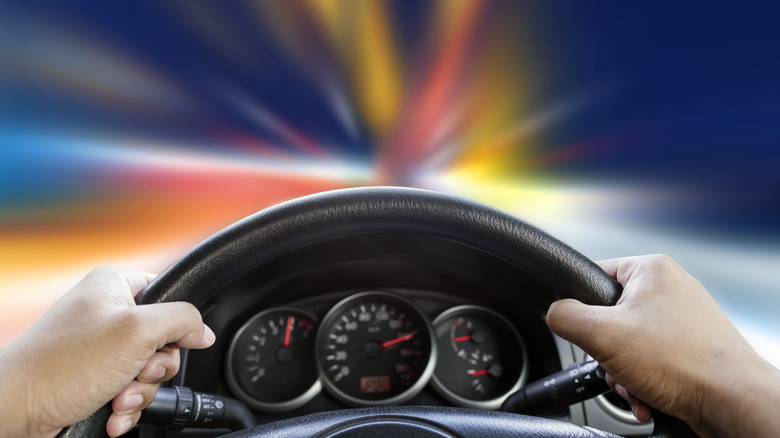If You Can't Remember Your Drive Home, Science Has An Answer For That
Have you ever been driving, and all of sudden, you're home but can't remember the journey? Maybe you've been partially home but, when you come to a stop, can't recall how fast you were going or how you got that far into your commute. You aren't alone. Feeling like you've lost time or not being able to remember driving is common and known as highway hypnosis.
Also referred to as road hypnosis, this phenomenon is a real thing and a combination of two behaviors. One is hyper-focused automatic attention, which is what happens when time flies during an activity: You're so wrapped up in the task that your brain goes into an autopilot mode and is subconsciously alert and focused on that task. The second is procedural memory, when the brain automatically recalls how to perform familiar tasks (like driving) without much conscious effort. The autopilot relies on the part of the brain that controls the primary physiological subconscious hub — the basal ganglia.
Highway hypnosis can happen to anyone. A study published in Accident Analysis & Prevention in 2004 found that it occurs most frequently on routes that people drive frequently, like those between home and the grocery store, school, and work. However, it happens on long road trips, too, particularly on monotonous straightaways where direction and speed remain relatively the same.
How to avoid highway hypnosis
Road hypnosis is characterized by mental fogginess, loss of concentration, or wandering thoughts. You might also feel dazed or sleepy, like your eyelids are heavy, or like your reaction time is slow. As registered psychotherapist Natacha Duke points out to Cleveland Clinic's Health Essentials, though, "Highway hypnosis is not the same thing as driving drowsy and it's not the same thing as driving while being distracted." She explains, "Your eyes are on the road and you're alert, but your automatic brain processes take over."
If you experience these feelings and are concerned about safety, though, there are ways to prevent highway hypnosis. Some simple environmental changes could help, such as listening to loud and upbeat music or even a new playlist, turning off cruise control, and taking different routes to your destination. When you eat before driving, don't have a large meal because it can make you drowsy. Have a light meal with clean proteins (like fish and chicken) and produce instead of red meats, lots of carbohydrates, and sugars.
During a long, monotonous drive, consider taking a break to stretch your legs. You could even take a quick walk or jog. Additionally, make sure you get enough good sleep beforehand. If you're feeling drowsy before you get behind the wheel, have some caffeine to boost your alertness. Caffeine affects your brain by blocking a sleep-boosting chemical called adenosine from binding to receptor proteins to make you fall asleep. Just sipping coffee or an energy drink while driving can break up the humdrum of the journey.

